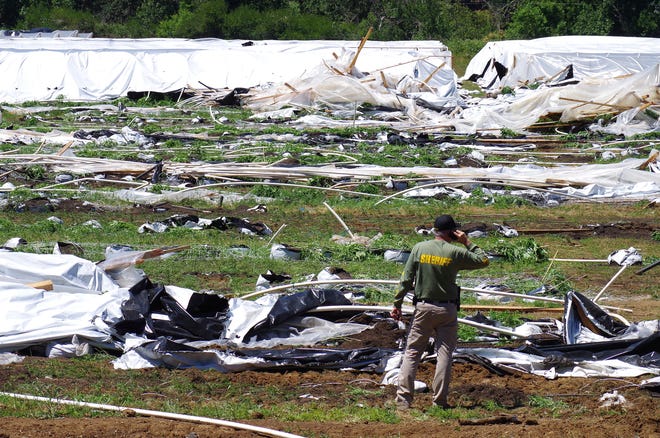Criminal gangs create a new cannabis-related challenge for authorities
SALEM, Ore. — Foreign drug cartels that established illegal outdoor marijuana farms in Oregon last year are expanding to large indoor grows, a state police official said Thursday. .
The new challenge emerged when a task force created by the Legislative Assembly met for the first time to determine how to tackle cannabis-related issues, some of which threaten the legal and regulated recreational marijuana industry with Oregon.
The Cannabis-Derived Intoxicants and Illegal Cannabis Production Task Force is also responsible for recommending a funding and command structure to enable law enforcement to combat illegal cannabis production, amend laws states to address labor trafficking and water theft by cartel-funded pot farms and regulation of cannabis genetic engineering, among other issues.
“It started with a simple request for help and it turned into ‘Oh my God, there’s so much to deal with.’ And so I think we just have to take one at a time,” said State Rep. Lily Morgan, a Republican from the southern town of Grants Pass, as the task force met via video link. .
One of the biggest problems is the recent proliferation of illegal, industrial-scale marijuana farms.
In early 2021, hundreds of greenhouses began popping up across Josephine and Jackson counties in southern Oregon, some within city limits, others cheekily established along highways or tucked away in remote valleys. .
They were not licensed by the Oregon Alcohol and Cannabis Commission and are funded by foreign criminal cartels from Latin America, Europe and Asia, authorities said. There were more pot farms than overworked law enforcement officials could destroy. Illegal indoor grow operations have long existed indoors, but now criminal gangs are pushing more in that direction, allowing them to thrive year-round, a task force member said.
“We’re starting to hear about Josephine County with a lot of operations moving inland,” Oregon State Police Sgt. Tyler Bechtel. “It makes it all the more difficult to see it from the street, to see it from the air, to smell it. And it’s not a seasonal problem when you move indoors. It’s a problem that lasts all year.
State police have identified dozens of ethnic drug trafficking organizations, each operating between five and 30 marijuana grow sites, Bechtel said.
To explore:In which states is weed legal? here is the list
Giving an idea of the scale of the problem, the Oregon Criminal Justice Commission says 551,000 marijuana plants were seized in Jackson County, Josephine County and Deschutes County in central Oregon. Oregon from July 1, 2020 to June 30, 2021. And that was a tiny fraction of illegal cultivation. Authorities also seized nearly $3.4 million in cash during the raids.
“Despite legal avenues for buying and selling marijuana in Oregon, an illegal marijuana market continues to pose public safety concerns, including the diversion of marijuana to other states, the sale of marijuana to underage buyers, illegal cultivation of marijuana on private, state and federal sites. property and enrichment of organized criminal operations,” the commission said in a report.
The report examined the results after spending millions of dollars in grants to the three counties to deal with the increase in illegal marijuana cultivation and distribution operations in Oregon. The commission said it could not judge the effectiveness of the subsidy program “because the illegal marijuana market is a particularly nebulous area to assess.”
The task force must provide its findings to an interim committee of the Legislative Assembly by December 31, 2022.


Comments are closed.